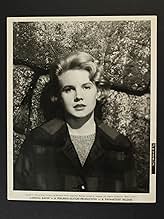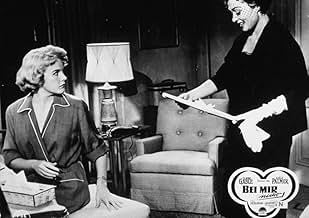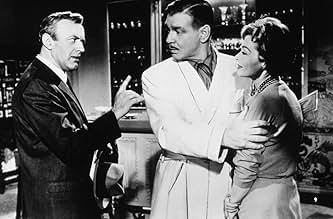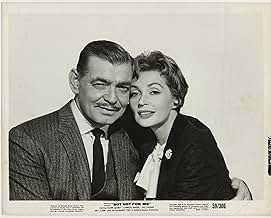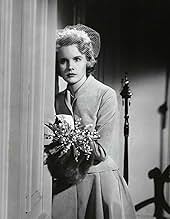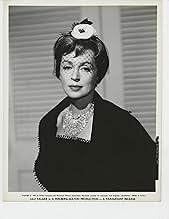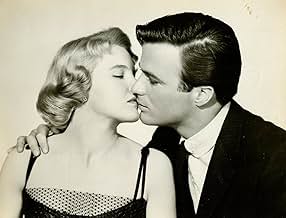Without a new play and money, a 55 y.o. Broadway theater producer retires. But when fired, his 22 y.o. secretary says, she loves him. He decides to make that a scene in a new play and her to... Read allWithout a new play and money, a 55 y.o. Broadway theater producer retires. But when fired, his 22 y.o. secretary says, she loves him. He decides to make that a scene in a new play and her to write it and play the role.Without a new play and money, a 55 y.o. Broadway theater producer retires. But when fired, his 22 y.o. secretary says, she loves him. He decides to make that a scene in a new play and her to write it and play the role.
- Director
- Writers
- Stars
- Awards
- 3 nominations total
Richard Adams
- Young Man
- (uncredited)
William Bailey
- Doorman
- (uncredited)
Richard Bull
- Ticket Seller
- (uncredited)
Charles Cane
- Mounted Policeman
- (uncredited)
Zelda Cleaver
- Maid
- (uncredited)
Stephen Courtleigh
- Minor Role
- (uncredited)
Hal K. Dawson
- Father in Play
- (uncredited)
Bess Flowers
- Diner at Sardi's
- (uncredited)
- Director
- Writers
- All cast & crew
- Production, box office & more at IMDbPro
Featured reviews
Clark Gable is a Broadway producer who feels his age and is ready to retire. Added to it is the fact that his ex, Lilli Palmer, pops in constantly for the alimony and aggravates him. Carroll Baker is his secretary, who's using her job as a stepping stone in her acting career. When she discloses to him, she's been pining for him from the beginning. he jumps on this plot in a way to save a playwright's problems with his play - instead of an old man going after a young girl, switch it. The stars provide charm and a bit of the nostalgic feel for Gable's older films, like "Wife vs. Secretary," with similarities to boot. But the main problem of this film is that it goes on for far too long and is too talky. Barry Coe likes Carroll, but with her interest in Gable, she hardly gives Barry the time of day. With its predictable ending, this should have been much shorter with less talk and definitely less bickering. But not for that, this is a must-see film for Gable fans. You'll just feel wore out by the end.
Charmer finds Gable at near the end of his career still fully in command of his star power as a somewhat roguish producer who is juggling both personal and professional issues.
Lilli Palmer is an excellent match for him, her continental charm playing off his brusk exasperation with surprising ease. She's so good it's a shame her role is rather small but she makes every moment she's on screen memorable and you miss her when she's out of the picture.
Lee J. Cobb likewise makes his modest role seem more than it is by filling it with his magnetic presence.
Carroll is sexy in a refined way, this was before she cast her lot in the sex symbol derby with junk like Harlow and The Carpetbaggers and wrecked her reputation as a serious actress for several years until she came back as a respected character actress.
The kind of breezy star vehicle that is rarely if ever made today, spotlighting the star but loaded with talent in almost every role. Competently directed and as an added bonus Ella Fitzgerald sings the title tune over the credits. For Gable fans this is a must!
Lilli Palmer is an excellent match for him, her continental charm playing off his brusk exasperation with surprising ease. She's so good it's a shame her role is rather small but she makes every moment she's on screen memorable and you miss her when she's out of the picture.
Lee J. Cobb likewise makes his modest role seem more than it is by filling it with his magnetic presence.
Carroll is sexy in a refined way, this was before she cast her lot in the sex symbol derby with junk like Harlow and The Carpetbaggers and wrecked her reputation as a serious actress for several years until she came back as a respected character actress.
The kind of breezy star vehicle that is rarely if ever made today, spotlighting the star but loaded with talent in almost every role. Competently directed and as an added bonus Ella Fitzgerald sings the title tune over the credits. For Gable fans this is a must!
At the tail end of his film career Clark Gable made a series of movies where his co-stars were not in his age group. Up to 1956 his co-stars might have been younger than him (Lana Turner comes to mind) but more frequently they were still in their late 30s to early 50s like Ava Gardner, Barbara Stanwyck, or Eleanor Parker. Then, at the tail end of the 1950s Gable made four movies where his co-stars were not within fifteen years of his age. These were TEACHER'S PET (with Doris Day), BUT NOT FOR ME (with Carol Baker), IT STARTED IN NAPLES (with Sophia Loren), and THE MISFITS (with Marilyn Monroe). In at least three of these films the co-star was as big a star as Gable. The exception is Baker, a promising actress in the period but one that never hit the same height of stardom as the others (her best recalled film role was HARLOW - ironically she played a great movie star who had fequently appeared opposite the young Gable). But if Baker lacked the magnetism of Day, Loren, or Monroe, her support to Gable is shared by an actress in his own age group again - Lily Palmer. And Palmer does her job very nicely.
In BUT NOT FOR ME Gable's character - a Broadway Producer - revives his career and that of a once prize-winning playwrite (Lee J. Cobb) when he discovers his secretary (Baker) is in love with him, and is trying to keep his latest production (Cobb's recent play) from being discarded as a failure. Baker revitalizes Gable, and makes him think of remarrying. He was once married to his leading stage lady (Palmer) who divorced him because of differences over lifestyle and life choices. Palmer, who oozes grace and charm, wanted a husband who was interested in home life with her. Gable was too into his production and impressario career, as well as enjoying living life to the most publicly fullest. However, as she watches Gable, Baker, and Cobb rework the play and make it work, Palmer slowly sees Gable bending over to make himself seem younger than he is. In fact a running joke in the film is Gable's confusion of his birth date and age, seemingly making it about ten or five years earlier than it is.
But Palmer keeps bringing Gable and Baker back to earth about their age differences. When Gable takes Baker into Central Park for a romantic moment alone on a bench, Palmer shows up, and gleefully remembers how he took her there too...years before. Gable does not appreciate this ("Are you sure it's safe to be alone here at this late hour?", he asks Palmer. "You might get stabbed!"). Eventually Gable sees the light...he and Palmer end up together again at the end, her helping him with his various pills in the closing moments of the film.
The operative word in the film is charm. Not only Palmer in needling Gable back to his senses, but also (surprisingly) Cobb, as he reforms from his hard drinking failure to his sober success. Even Thomas Gomez is funny in this film, playing a character based on Greek movie theatre tycoon Spyros Skouras. Cobb dislikes money men (Gomez is a potential play backer), and tells Gomez so, saying "Who financed Shaw?" "Who financed Shakespeare?" "Who financed Sophocles?" An angry and fed-up Gomez shouts, "I did!" Taken aback, Cobb asks, "You?". "Sure", says Gomez, "And the production flopped. Why do you suppose I left Greece to come here?"
A friendly little film to watch, and possibly a wise one.
In BUT NOT FOR ME Gable's character - a Broadway Producer - revives his career and that of a once prize-winning playwrite (Lee J. Cobb) when he discovers his secretary (Baker) is in love with him, and is trying to keep his latest production (Cobb's recent play) from being discarded as a failure. Baker revitalizes Gable, and makes him think of remarrying. He was once married to his leading stage lady (Palmer) who divorced him because of differences over lifestyle and life choices. Palmer, who oozes grace and charm, wanted a husband who was interested in home life with her. Gable was too into his production and impressario career, as well as enjoying living life to the most publicly fullest. However, as she watches Gable, Baker, and Cobb rework the play and make it work, Palmer slowly sees Gable bending over to make himself seem younger than he is. In fact a running joke in the film is Gable's confusion of his birth date and age, seemingly making it about ten or five years earlier than it is.
But Palmer keeps bringing Gable and Baker back to earth about their age differences. When Gable takes Baker into Central Park for a romantic moment alone on a bench, Palmer shows up, and gleefully remembers how he took her there too...years before. Gable does not appreciate this ("Are you sure it's safe to be alone here at this late hour?", he asks Palmer. "You might get stabbed!"). Eventually Gable sees the light...he and Palmer end up together again at the end, her helping him with his various pills in the closing moments of the film.
The operative word in the film is charm. Not only Palmer in needling Gable back to his senses, but also (surprisingly) Cobb, as he reforms from his hard drinking failure to his sober success. Even Thomas Gomez is funny in this film, playing a character based on Greek movie theatre tycoon Spyros Skouras. Cobb dislikes money men (Gomez is a potential play backer), and tells Gomez so, saying "Who financed Shaw?" "Who financed Shakespeare?" "Who financed Sophocles?" An angry and fed-up Gomez shouts, "I did!" Taken aback, Cobb asks, "You?". "Sure", says Gomez, "And the production flopped. Why do you suppose I left Greece to come here?"
A friendly little film to watch, and possibly a wise one.
One of those bubbly late-'50s romantic comedies that thinks it's cleverer than it is and seems terribly pleased with itself. The actors grit their teeth and play the familiar froth as if it were Moliere, and you admire them for trying. Gable is Gable, unforced and likeable but not a natural comedian, and Palmer gives her bitchy character a warmth not found in the dialogue. The movie's main asset is the handsome black-and-white photography of midtown Manhattan (I'd like to have seen more marquees), and the nostalgic ambience of that long-ago era when theater was actually a topic of discourse among the general population.
"But Not for Me" is one of the last films that Clark Gable made. The "king of Hollywood" had made some of the best comedy and drama romances of the first three decades of sound movies. He died at age 59 of a heart attack in 1960.
Gable shows his age in this film, and it's even a part of the comedy. The plot is familiar - a washed up Broadway producer makes a go at one last hit. But this story has more to it. Gable's Russ Ward isn't yet washed up. He's just aging and needs another hit to be able to maintain his high living standards. And that last is a very interesting piece of the story that gives this film some historical value as well.
The film is based on a 1934 play, "Accent on Youth," written by Samson Raphaelson. It was a smash hit on both Broadway, where it opened on Christmas day, and in London's West End where Greer Garson played the female lead. It was first made into a movie with its original title in 1935. Herbert Marshall and Sylvia Sidney starred. Bing Crosby starred in a musical comedy version in 1950, "Mr. Music." But this is by far the best version. It's both, very funny and warm-hearted. It got three Golden Globe nominations in 1960.
This is one of the best films that shows the politics and propaganda of Broadway. It touches on the writing and developing of plays, on audience trial runs and critics, and on the promotion and manipulation of the press. In a nutshell, it's about promoters, as Ward calls himself. And, it has more than a little spoofing of the field with some soft satire.
The film has a dynamite cast with other actors who lend a lot to the story. Lili Palmer is especially good as Kathryn Ward, Russ's ex-wife who still is his biggest fan. Lee J. Cobb is the hard-drinking Jeremiah MacDonald, a once great playwright whom Russ won't give up on. Carroll Baker has a good role, as do a number of others.
While this isn't a comedy of large belly laughs, it is loaded with clever quips and witty remarks. The funny lines are non-stop in this warm, feel-good comedy romance that provides a good peek at some of the shenanigans behind Broadway plays.
Here are some favorite lines. For more dialog, see the Quotes section under this IMDb Web page of the movie.
Russ Ward, "The public makes the stars. I only make the opportunity." Roy Morton, "Corny, but quotable."
Russ Ward, "Does that wrap it up, Roy, or do you need some more?" Roy Morton, "Well, if I do, suppose I just invent it?" Russ Ward, "Isn't that what you usually do anyway?"
Al Atwood, "The money you spent gambling this year'd support all the people in Schenectady for one week." Russ Ward, "A man's allowed one vice." Al Atwood, "But the way you do it, it's not a vice. It's a felony."
Demetrios Bacos, "They tell me you play tennis, golf, ride horseback. Maybe you come see my heart specialist?" Russ Ward, "I've seen him. He looks terrible."
Russ Ward, "You shouldn't be in any trouble, Demetrios, with all those movies you sold to television." Demetrios Bacos, "For peanuts. I sold out to the enemy."
After the maid carries a large birthday cake with many lit candles and sets it on the table in front of Russ, Kathryn Ward says, "I didn't tell anyone, darling, because I know you wouldn't want to embarrass them into bringing expensive gifts." Jeremiah MacDonald, "Looks like the Chicago fire." Ellie Brown looks quizzically at all the candles, and Demetrios Bacos says, "There must be a hundred candles on it." Kathryn Ward, "Now, Demi, don't be ridiculous. There are only 51." Looking at Russ, she says, "Sorry, dear, that's all we had."
Russ Ward, "Do you remember? There's a curfew in Central Park for unescorted women." Kathryn Ward, "How many first night mornings we spent here, Russ and I, holding hands and sitting on our reviews so we'd be on top of the world." Russ Ward, "Do you think it's safe being out here alone? You might easily get stabbed."
Russ Ward, "It's been a long time since I kissed you, but..." Kathryn Ward, "Now don't start getting sentimental. I'm just here protecting my alimony."
Ellie Brown, "I thought I was heading for a two-day honeymoon. But instead, he was going all the way back to his hometown - Butte, Montana. He was kidnapping me, now... today. I want an annulment." Russ Ward, "Well, unfortunately, Butte, Montana is not grounds for annulment... yet."
Two mounted policemen are outside the Broadway theater as the patrons leave on the opening night of Russ Ward's new show. The first policeman says, "Well, I'm afraid it sounds like a hit." The second policeman pats his horse's neck and says, "Yeah, another winter out here - every night. Sorry old-timer. Well, let's go."
Gable shows his age in this film, and it's even a part of the comedy. The plot is familiar - a washed up Broadway producer makes a go at one last hit. But this story has more to it. Gable's Russ Ward isn't yet washed up. He's just aging and needs another hit to be able to maintain his high living standards. And that last is a very interesting piece of the story that gives this film some historical value as well.
The film is based on a 1934 play, "Accent on Youth," written by Samson Raphaelson. It was a smash hit on both Broadway, where it opened on Christmas day, and in London's West End where Greer Garson played the female lead. It was first made into a movie with its original title in 1935. Herbert Marshall and Sylvia Sidney starred. Bing Crosby starred in a musical comedy version in 1950, "Mr. Music." But this is by far the best version. It's both, very funny and warm-hearted. It got three Golden Globe nominations in 1960.
This is one of the best films that shows the politics and propaganda of Broadway. It touches on the writing and developing of plays, on audience trial runs and critics, and on the promotion and manipulation of the press. In a nutshell, it's about promoters, as Ward calls himself. And, it has more than a little spoofing of the field with some soft satire.
The film has a dynamite cast with other actors who lend a lot to the story. Lili Palmer is especially good as Kathryn Ward, Russ's ex-wife who still is his biggest fan. Lee J. Cobb is the hard-drinking Jeremiah MacDonald, a once great playwright whom Russ won't give up on. Carroll Baker has a good role, as do a number of others.
While this isn't a comedy of large belly laughs, it is loaded with clever quips and witty remarks. The funny lines are non-stop in this warm, feel-good comedy romance that provides a good peek at some of the shenanigans behind Broadway plays.
Here are some favorite lines. For more dialog, see the Quotes section under this IMDb Web page of the movie.
Russ Ward, "The public makes the stars. I only make the opportunity." Roy Morton, "Corny, but quotable."
Russ Ward, "Does that wrap it up, Roy, or do you need some more?" Roy Morton, "Well, if I do, suppose I just invent it?" Russ Ward, "Isn't that what you usually do anyway?"
Al Atwood, "The money you spent gambling this year'd support all the people in Schenectady for one week." Russ Ward, "A man's allowed one vice." Al Atwood, "But the way you do it, it's not a vice. It's a felony."
Demetrios Bacos, "They tell me you play tennis, golf, ride horseback. Maybe you come see my heart specialist?" Russ Ward, "I've seen him. He looks terrible."
Russ Ward, "You shouldn't be in any trouble, Demetrios, with all those movies you sold to television." Demetrios Bacos, "For peanuts. I sold out to the enemy."
After the maid carries a large birthday cake with many lit candles and sets it on the table in front of Russ, Kathryn Ward says, "I didn't tell anyone, darling, because I know you wouldn't want to embarrass them into bringing expensive gifts." Jeremiah MacDonald, "Looks like the Chicago fire." Ellie Brown looks quizzically at all the candles, and Demetrios Bacos says, "There must be a hundred candles on it." Kathryn Ward, "Now, Demi, don't be ridiculous. There are only 51." Looking at Russ, she says, "Sorry, dear, that's all we had."
Russ Ward, "Do you remember? There's a curfew in Central Park for unescorted women." Kathryn Ward, "How many first night mornings we spent here, Russ and I, holding hands and sitting on our reviews so we'd be on top of the world." Russ Ward, "Do you think it's safe being out here alone? You might easily get stabbed."
Russ Ward, "It's been a long time since I kissed you, but..." Kathryn Ward, "Now don't start getting sentimental. I'm just here protecting my alimony."
Ellie Brown, "I thought I was heading for a two-day honeymoon. But instead, he was going all the way back to his hometown - Butte, Montana. He was kidnapping me, now... today. I want an annulment." Russ Ward, "Well, unfortunately, Butte, Montana is not grounds for annulment... yet."
Two mounted policemen are outside the Broadway theater as the patrons leave on the opening night of Russ Ward's new show. The first policeman says, "Well, I'm afraid it sounds like a hit." The second policeman pats his horse's neck and says, "Yeah, another winter out here - every night. Sorry old-timer. Well, let's go."
Did you know
- TriviaThe film's original title was "Accent on Youth", but this was thought inappropriate for the 57-year-old star Clark Gable.
- Quotes
Russell 'Russ' Ward: The public makes the stars. I only make the opportunity.
Roy Morton: Corny, but quotable.
- ConnectionsFeatured in Clark Gable: Tall, Dark and Handsome (1996)
Details
- Runtime
- 1h 51m(111 min)
- Color
- Aspect ratio
- 1.85 : 1
Contribute to this page
Suggest an edit or add missing content

